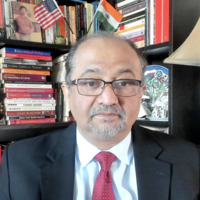Books by Beatrice Jauregui

Policing as a global form is often fraught with excessive violence, corruption, and even criminal... more Policing as a global form is often fraught with excessive violence, corruption, and even criminalization. These sorts of problems are especially omnipresent in postcolonial nations such as India, where Beatrice Jauregui has spent several years studying the day-to-day lives of police officers in its most populous state, Uttar Pradesh. In this book, she offers an empirically rich and theoretically innovative look at the great puzzle of police authority in contemporary India and its relationship to social order, democratic politics, and security.
Jauregui explores the paradoxical demands placed on Indian police, who are at once routinely charged with abuses of authority at the same time that they are asked to extend that authority into any number of both official and unofficial tasks. Her ethnography of their everyday life and work demonstrates that police authority is provisional in several senses: shifting across time and space, subject to the availability and movement of resources, and dependent upon shared moral codes and relentless instrumental demands. In the end, she shows that police authority in India is not a vulgar manifestation of raw power or the violence of law but, rather, a contingent social resource relied upon in different ways to help realize human needs and desires in a pluralistic, postcolonial democracy.
Provocative and compelling, Provisional Authority provides a rare and disquieting look inside the world of police in India, and shines critical light on an institution fraught with moral, legal and political contradictions.
The SAGE Handbook of Global Policing examines and critically retraces the field of policing studi... more The SAGE Handbook of Global Policing examines and critically retraces the field of policing studies by posing and exploring a series of fundamental questions to do with the concept and institutions of policing and their relation to social and political life in today's globalized world. The volume is structured in the following four parts:
Part One: Lenses
Part Two: Social and Political Order
Part Three: Legacies
Part Four: Problems and Problematics.
By bringing new lines of vision and new voices to the social analysis of policing, and by clearly demonstrating why policing matters, the Handbook will be an essential tool for anyone in the field.

"Global events of the early twenty-first century have placed new stress on the relationship among... more "Global events of the early twenty-first century have placed new stress on the relationship among anthropology, governance, and war. Facing prolonged insurgency, segments of the U.S. military have taken a new interest in anthropology, prompting intense ethical and scholarly debate. Inspired by these issues, the essays in Anthropology and Global Counterinsurgency consider how anthropologists can, should, and do respond to military overtures, and they articulate anthropological perspectives on global war and power relations.
This book investigates the shifting boundaries between military and civil state violence; perceptions and effects of American power around the globe; the history of counterinsurgency doctrine and practice; and debate over culture, knowledge, and conscience in counterinsurgency. These wide-ranging essays shed new light on the fraught world of Pax Americana and on the ethical and political dilemmas faced by anthropologists and military personnel alike when attempting to understand and intervene in our world."
Articles & Chapters by Beatrice Jauregui

This article describes and explains “police vigilantism” as a mode of authoritative extra-legal c... more This article describes and explains “police vigilantism” as a mode of authoritative extra-legal coercion performed by public police officials conceived as doing their duty to realize justice in the world. Based on ethnographic observations, interviews and content analysis of news and entertainment media as well as official government reports, this essay examines a specific form of police vigilantism in contemporary India known as encounter killings. Demonstrating that encounter killings are widely constituted as a form of ritual purification and social defense by self-sacrificing police, it theorizes a metaphysics of police vigilantism in India that combines generalized experiences of insecurity with shared cosmologies of just war. Comparing this metaphysics with justified state violence in other global south contexts, this study sheds light on how such violence may be legitimated through a conceptual inextricability of law and war as embodied in uniquely a constituted human figure: the police vigilante.

American Ethnologist, Feb 2014
This article examines legitimations of corruption in northern India as expressions of a social or... more This article examines legitimations of corruption in northern India as expressions of a social order in which positional power, and the conceptual boundaries between virtue and vice, are continually shifting and contested. Through an ethnography of the everyday practices of police, I demonstrate how people often describe activities and relationships associated with corruption as jugaad, a colloquial Hindi term referring to goal-oriented improvisation or recombination of resources—especially the use of informal social networks to advance personal, professional, or political interests. But just as often as jugaad seems to be understood as isomorphic with corruption, lending it a negative moral valence, it is also conceived as the opposite of corruption, the moral high ground one must take in order to navigate a world of endemic depravity. I argue that this contradiction emerges in large part from a positive cultural evaluation of what I call “provisional agency”. Provisional agency has a dual meaning of a desired capability to provide a social good, on the one hand, and a temporary means of mobility geared toward a better future, on the other. Building on previous anthropological analyses of the complexities of corruption in everyday practice, I deploy the concept of provisional agency in a way that compels us to turn away from conventional questions about immoral activity helping to realize power, toward understanding how expressions of agency help to realize shifts in, and contestations over, moral boundaries. I aim to inspire further research on the co-configuration of morality and power, and help build a comparative anthropology of social connectedness and corruption.
Law and Social Inquiry, 2013

Law and Social Inquiry, 2013
It is a popular truism that police in India generally lack legitimate authority and public trust.... more It is a popular truism that police in India generally lack legitimate authority and public trust. This lack is widely understood by scholars, policy analysts, and practitioners as being rooted in the institution’s colonial development as a means of oppression, and its alleged corruption and criminalization in the postcolonial period. The social facts of situational hyper-empowerment and widespread decadence of police do much to explain their poor image and performance; but these explanations do not account for the fact that police in India are also structurally disempowered by cultural-political and legal-institutional claims to multiple and conflicting forms of authority that challenge and often overwhelm the authority of police. This structural disempowerment and its performances in everyday interactions between the police and the public constitute an ongoing social process of delegitimation of police authority in contemporary India. Following ethnographic analysis of this process of delegitimation, I explore the implications of focusing on police disempowerment for theorizations of the sources and capabilities of state legal authority more generally.

Policing and Contemporary Governance: The Anthropology of Police in Practice, Jun 2013
This ethnography of the everyday life and work of police in northern India revisits some intracta... more This ethnography of the everyday life and work of police in northern India revisits some intractable questions for the anthropologist who directly engages violence and power in the field: How do we understand violence, especially state violence? How do we understand and negotiate the vulnerabilities, responsibilities and complicities of violent agents, as well as those of the ethnographer who aims to understand the life worlds of these agents? What kinds of knowledge are produced in these ethnographic encounters, and how should they be framed and represented? And finally, how do we conduct ethnography with interlocutors who engage in violence on a routine basis, willfully, or as part of their job description, and still maintain professional ethical standards and the directionality of our moral compass? I argue that while there is no way around or out of complicity, a concept of “strategic complicity” can serve as guide in navigating the murky work of “dirty anthropology”.
Patronage as the Politics of South Asia, 2014

A Companion to the Anthropology of India, Mar 8, 2011
Within and outside of its international borders, India is praised as the world's largest democrac... more Within and outside of its international borders, India is praised as the world's largest democracy, a superlative if still developing success story held together by a constitution (also the world's longest) that espouses fundamental ideals of freedom, equality and justice for all. At the same time, this vast and pluralist nation-state is represented as plagued not only by negative "development indicators" like mass poverty and illiteracy, but also by an apparent decadence -or in some times and places, a total absence -of "law and order." Public discourses in India are rife with claims of systemic inefficiencies and state-sponsored iniquities including communalism, corruption and police brutality. Indeed, police are perhaps the most visible and publicly reviled state agents, generally believed to be complicit in virtually all illicit transactions either as extortionist brokers, underhand fixers, or violent instruments of unbridled power. Their institutional records of human rights abuses and mass atrocities are legion and legend, although it is important to note that historically police have also not infrequently been attacked and overcome by angry crowds. And yet, police still represent a resource for many people, and command obedience not merely through terror and tyranny but also through an authority and potency that works among the complex interstices of legality and legitimacy. What accounts for these paradoxical realities? And what can an anthropological examination of law and order, and its authorized keepers in the police, tell us about democratic politics and the state in contemporary India more broadly?

Blurring Military and Police Roles, Sep 30, 2010
This chapter begins with the following assumption: as the nation-state has become the standard un... more This chapter begins with the following assumption: as the nation-state has become the standard unit of governance, the police and the military have co-developed in both theory and practice as the primary institutional means of coercion providing security and order within and among states. While an idealized distinction between these modes of security remains globally hegemonic, an historical philosophical analysis shows us that in fact, they are always already muddled. Moreover, the line allegedly distinguishing police and military institutions is not only “blurry” but also manipulable. This is demonstrated in the chapter first via discussion of the development in the West of a concept of “civilized” security. The analysis then proceeds to explain how this concept of civilized security—or, more to the point, civil forms of coercion—played out in practice in various European colonies, and specifically in the British Raj in South Asia. It observes how colonial administrators fought long and hard about how best to organize a police organization that would somehow simultaneously resemble and be distinct from the military; and most importantly how a militarized security apparatus was legitimized by labeling it a civil police. Finally, we apply the insights gained from an historical analysis of the co-development of police and military institutions in colonial South Asia to contemporary issues of policing in India as well as problems of transnational policing and policing of “transitional democracies” across the globe. The analysis ultimately concludes that we must denaturalise and historicise our assumptions about the moral ascendancy of “the civil”, especially with regard to state coercion, discussions of providing security and order.
PublicBooks.Org, Feb 14, 2013
A collaborative visual essay considering images of American soldiers.
Film by Beatrice Jauregui
What does it mean to be a combat veteran in America? How do the experiences of returning soldiers... more What does it mean to be a combat veteran in America? How do the experiences of returning soldiers today differ from those of the veterans who have come before? And how does the public image of the veteran reflect and shape a culture of persistent war? American Communion addresses these questions by melding intimate portraits of veterans of the US-led conflicts in Vietnam, Iraq, and Afghanistan, with analysis of historical shifts in American practices of war making. Focusing on personal struggles with soldier identity, family relationships, civilian employment, and post-traumatic stress, this film sheds new light on the combat veteran as a living individual, and as a cultural figure, asking critical questions about the impact of global interventions on the home front.
Papers by Beatrice Jauregui
Oxford University PressNew York eBooks, Feb 13, 2023
Routledge eBooks, Jan 11, 2023
Social Science, Provisional Authority, Nov 28, 2016











Uploads
Books by Beatrice Jauregui
Jauregui explores the paradoxical demands placed on Indian police, who are at once routinely charged with abuses of authority at the same time that they are asked to extend that authority into any number of both official and unofficial tasks. Her ethnography of their everyday life and work demonstrates that police authority is provisional in several senses: shifting across time and space, subject to the availability and movement of resources, and dependent upon shared moral codes and relentless instrumental demands. In the end, she shows that police authority in India is not a vulgar manifestation of raw power or the violence of law but, rather, a contingent social resource relied upon in different ways to help realize human needs and desires in a pluralistic, postcolonial democracy.
Provocative and compelling, Provisional Authority provides a rare and disquieting look inside the world of police in India, and shines critical light on an institution fraught with moral, legal and political contradictions.
Part One: Lenses
Part Two: Social and Political Order
Part Three: Legacies
Part Four: Problems and Problematics.
By bringing new lines of vision and new voices to the social analysis of policing, and by clearly demonstrating why policing matters, the Handbook will be an essential tool for anyone in the field.
This book investigates the shifting boundaries between military and civil state violence; perceptions and effects of American power around the globe; the history of counterinsurgency doctrine and practice; and debate over culture, knowledge, and conscience in counterinsurgency. These wide-ranging essays shed new light on the fraught world of Pax Americana and on the ethical and political dilemmas faced by anthropologists and military personnel alike when attempting to understand and intervene in our world."
Articles & Chapters by Beatrice Jauregui
Film by Beatrice Jauregui
Papers by Beatrice Jauregui
Jauregui explores the paradoxical demands placed on Indian police, who are at once routinely charged with abuses of authority at the same time that they are asked to extend that authority into any number of both official and unofficial tasks. Her ethnography of their everyday life and work demonstrates that police authority is provisional in several senses: shifting across time and space, subject to the availability and movement of resources, and dependent upon shared moral codes and relentless instrumental demands. In the end, she shows that police authority in India is not a vulgar manifestation of raw power or the violence of law but, rather, a contingent social resource relied upon in different ways to help realize human needs and desires in a pluralistic, postcolonial democracy.
Provocative and compelling, Provisional Authority provides a rare and disquieting look inside the world of police in India, and shines critical light on an institution fraught with moral, legal and political contradictions.
Part One: Lenses
Part Two: Social and Political Order
Part Three: Legacies
Part Four: Problems and Problematics.
By bringing new lines of vision and new voices to the social analysis of policing, and by clearly demonstrating why policing matters, the Handbook will be an essential tool for anyone in the field.
This book investigates the shifting boundaries between military and civil state violence; perceptions and effects of American power around the globe; the history of counterinsurgency doctrine and practice; and debate over culture, knowledge, and conscience in counterinsurgency. These wide-ranging essays shed new light on the fraught world of Pax Americana and on the ethical and political dilemmas faced by anthropologists and military personnel alike when attempting to understand and intervene in our world."